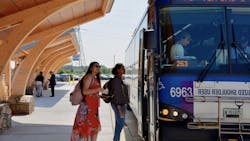Pace Board approves purchase of additional battery-electric buses, solidifies expanded pilot routes
The board of directors for Pace Suburban Bus (Pace) approved the purchase of new electric buses and the permanent adoption of several pilot routes at its most recent meeting. The board also continued preparations for the upcoming public hearings on proposed changes to the Taxi Access and Rideshare Access Programs.
As part of its transition to a zero-emissions fleet, the Pace Board authorized the purchase of 27 new 40-foot battery-electric buses from GILLIG. Additionally, the board approved Pace’s work with the Chicago Transit Authority on a joint procurement of battery-electric buses for 2025 and 2026.
The board also made permanent several pilot service expansions that were implemented last year. Effective on or after July 17, 2025, routes 330, 331, 755, 850, 851 and 855 will continue operating under their expanded schedules, which Pace says have seen measurable ridership increases between August 2024 and May 2025. The service enhancements were designed to connect residents to jobs, education and essential services, and they are funded in Pace’s 2025 operating budget.
Pace is also planning to host six public hearings regarding proposed changes to the Taxi Access Program (TAP) and the Rideshare Access Program (RAP), as outlined in the Regional Transportation Authority’s (RTA) ADA Paratransit Action Plan. The proposal from the RTA includes increasing the fare to $3.25 and implementing a 30-trip-per-month cap.
Pace Executive Director Melinda Metzger also reported to the board that Pace has started its 2026 budget development in accordance with the RTA’s recent budget call, which asks service boards to develop two budget scenarios due to ongoing fiscal uncertainty. The first scenario provides no new funding in 2026 and the second scenario provides a temporary stopgap that maintains current service levels.
The RTA has requested both scenarios include a fare increase and identify operational efficiencies equal to five percent of 2024 expenses. Pace also has a third scenario that assumes funding for its ReVision plan, a transformational blueprint to strengthen suburban transit service.
“The coming months are critical,” Metzger said. “We are actively working with legislators and stakeholders to secure a sustainable funding solution that allows us to build the transit system our region needs.”
